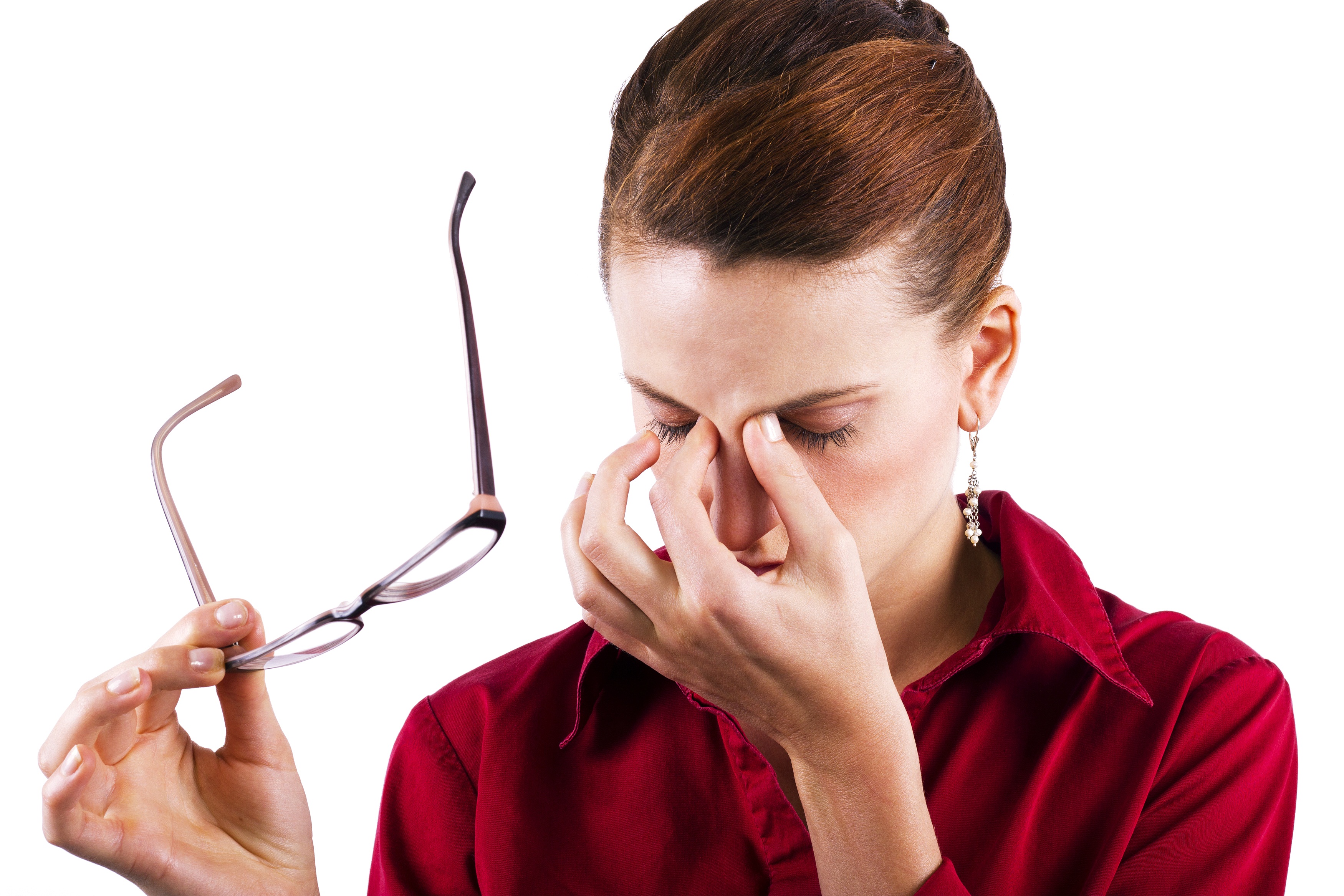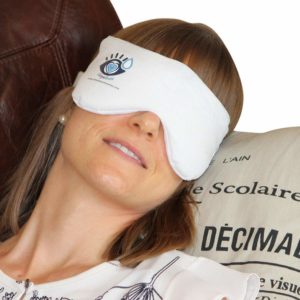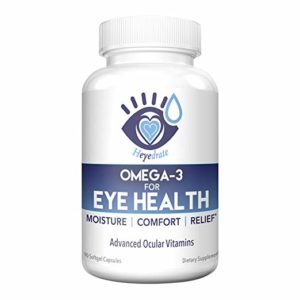[vc_row][vc_column][vc_column_text]In a high-tech world surrounded by gadgets and all manner of electronics, it’s not surprising to suffer from eye fatigue or tired eyes. The continued usage of these devices puts a strain on our eyes after hours of repeated use. The light that is projected into our eyes is bad enough, but combine that with several other factors, and it’s no surprise that the constant use of these devices over time builds up, leading to chronic eye conditions and in some cases even blindness.
If you suffer from tired eyes, then there is most likely an underlying cause, and the most common is use of electronics like computers or other devices at work. Most Americans work eight hours and depending upon the type of job you hold, that could mean continued exposure to a computer monitor, either for part of those eight hours or for the entirety of your shift. This continued use can ultimately affect your ability to work once your eyes feel tired. It becomes harder to focus on the screen in front of you. Constant glare can make you squint to see the screen better. All these things culminate into eye fatigue.
Before you can help relieve those tired eyes of yours, you need to be able to recognize the signs of eye fatigue.
Signs and symptoms
- Neck and shoulder pain


- Dry eyes
- Headaches
- Blurred vision
- Eyestrain
Having a better understanding of the signs and symptoms of eye fatigue can help you to figure out what might work for you to reduce tired eyes.
Neck and shoulder pain
Remaining in one position too long can cause our muscles to freeze in that position. Most who use computers everyday don’t move the entire time while sitting in front of the computer. Being able to shift around at your desk and having a comfortable, adjustable chair can help to reduce this.
Dry eyes
Repeated use of electronics can result in dry eyes; this is most commonly attributed to a lack of blinking. If you’re experiencing constant dry eyes, then you might want to consider supplementing your own natural tears with an Omega 3. Becoming more aware of blinking can also help you to reduce continued eye fatigue.
Headaches
If you’ve had too much screen time and begin to develop headaches, this can be a sign of prolonged eye tiredness. It can also be a symptom of a developing eye condition such as farsightedness.
Blurred vision
After hours of use, your vision could become blurry and result in further eye strain, as you have to try harder to focus on what you’re seeing. Letters, numbers, or whole words could become blurred and seem to blend into the page.
Eyestrain
This can feel like there is tension in the muscles of the eye, a tightness that won’t go away. It’s been referred to as a pulling sensation as it takes more work for your tired eyes to focus on whatever it is you’re still working on.
Eye fatigue, when correlated directly to the use of computers, actually has its own name, computer vision syndrome (CVS). Like it sounds, this syndrome is when your eyes feel tired due to the prolonged use of computers.
The symptoms listed above are warning signs of what may make your eyes feel tired, but what causes those symptoms? There are things you can do when you are focused on a computer screen for an extended amount of time, be it at work or at home.
Top Related Article: Eye Strain Causes
Effects of light on eyes
When it comes to our eyes, there is a multitude of reasons they can be affected by our daily interaction with electronic devices, the most notable being light. There are different kinds of light and each one of those has a different effect on our eyes. Sunlight is a good example of the different kinds of light we can experience, as it has visible and invisible rays of light.
Ultraviolet rays


Blue light
Although blue light comes from the sun just like UV light, there is a difference between the blue light from the sun and the blue light from our digital devices. The blue light from our screens is a known source of digital eye fatigue because the blue light emitted from the screen is not disbursed in the same manner as if it was coming directly from the sun.
How does blue light affect our eyes?
The blue light found in our digital devices is bright to make seeing things easier, but that same feature we love is also harmful. Blue light can penetrate all the way back to the very deepest part of our eyes, the retina. Consequently, it can cause damage to the retina, the sensitive cells that make it up, and the cells surrounding it. A common threat is that blue light might have a direct link to macular degeneration, a condition we can develop that can lead to permanent vision loss.
However, even though it has some detrimental effects, blue light itself isn’t to blame as it’s been shown that blue light can help keep us alert, aid in our memory, and keep us in a better mood. It’s used in light therapy for those who are affected by seasonal affective disorder, a type of depression which develops during the changes of seasons, most notably from fall to winter.
Eye protection
The best thing you can do if you’re concerned about the effects of harmful light on your eyes is to limit your exposure. If you cannot do that, then consider getting some kind of protection from UV and blue light. Many digital devices now come with a blue light option to help shield our eyes from the light they give off. If yours do not come with that feature, you could always purchase a pair of protective glasses meant to shield your eyes from one or both of these types of light.
Top Related Article: Eye Protector
What causes eye fatigue?
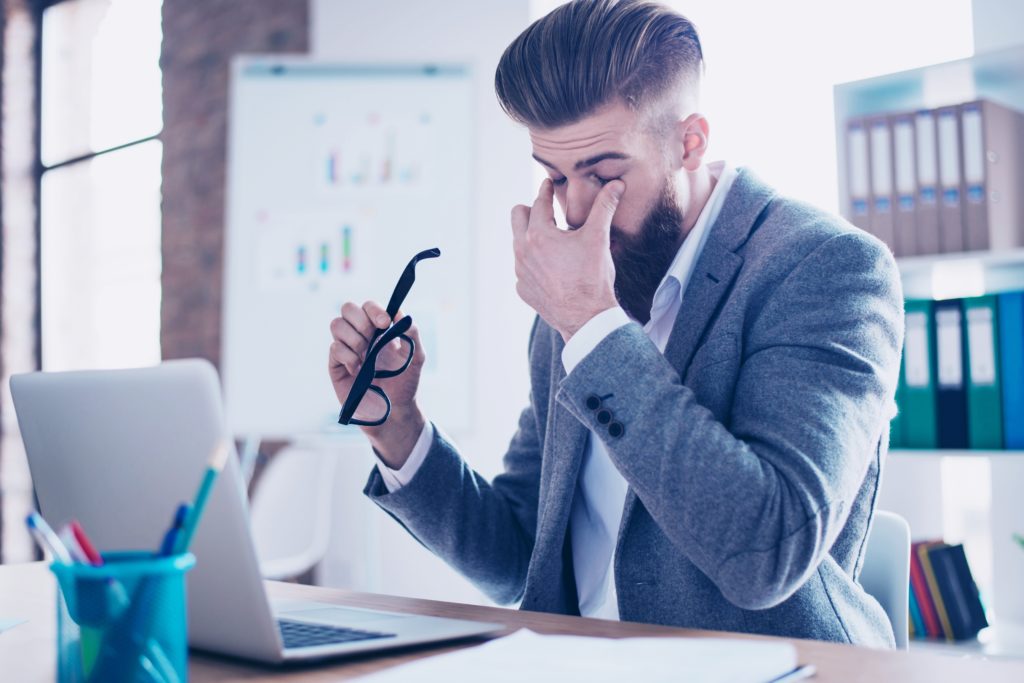

- Poor sitting posture
- Poor lighting
- Glare on screen
- Distance to screen
- Uncorrected vision problems
Poor seating posture
Most wouldn’t assume that your posture or lack thereof would affect your eyes, but it does. Having a bad posture can mean that you’re not level with your screen or keyboard, which not only attributes to tired eyes, but also muscle strain throughout your body. Having a chair that is adjustable will at least help in part to correct this attributing factor to eye fatigue. It’s up to you to learn how to sit up straight.
Poor lighting
This should go without saying. Watching television, working on a computer or any other electronic is damaging enough. Add in the effects of poor lighting, and you’re just making things worse. A lack of proper lighting means that our eyes must aadjust to the brightness of the screen, which naturally causes eye fatigue. And when you add in the effects of the screen time itself, it just compounds upon one another to give you eye fatigue.
Glare on screen
Unlike poor lighting, this might not be because you are working in the dark. Any glare that comes across your screen can cause this factor in tired eyes. Incoming light from a window or having a light in the wrong position can cause unwanted glare to your screen. This can have the same effect as having the sun in your eye.
Distance to screen
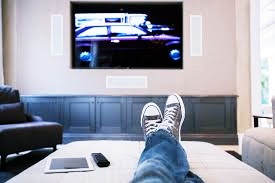

Uncorrected vision problems
If you’re suffering the effects of tired eyes, then you should first find out if you have any uncorrected vision problems that might be causing you to have tired eyes all the time. Eye conditions like farsightedness, astigmatism, presbyopia, and the lack of eye coordination abilities can all be things that can be found with an eye exam. Getting treatment for one of these conditions may render an improvement of your overall eye health and help to prevent further eye fatigue. Getting glasses or contact lenses with the intention of wearing them for computer use will help reduce eye tiredness by focusing your eyes properly on what you’re viewing.
What to do for tired eyes
If you’re suffering from tired eyes, making small adjustments could mean the difference between suffering from prolonged eye fatigue and having healthier eyes. Now that you have an understanding of the symptoms of eye fatigue and the causes of it, you should look at some simple tips and tricks to help correct everyday contributing factors to tired eyes.
How to fix Tired eyes at work
- Location of computer
- Seating
- Work documents
- Lighting
- Breaks
Location, Location, Location.
Computer The location of your computer is important. Having the screen and keyboard too close or too far away can contribute not only too tired eyes, but to other musculature issues. This can result in a poor posture which might have you leaning forward in an effort to see things clearly on your screen. A general rule of thumb is to have your computer screen 20-28 inches away from yourself with the screen being 15 degrees below your eye level. That’s about four to five inches in case you were wondering.
Chair Staying above your computer and keyboard means that your body won’t have to work as hard to be efficient. Likewise, having your desk chair at the proper alignment can save you a lot of trouble in the future. You need to find yourself a comfortable chair that is adjustable, keeping in mind that the best position to be in while working is to have your feet flat on the floor. Additional arm support to help keep your wrists off of the keyboard when typing will help prevent strain on the rest of your body.
Work materials If you work someplace where you have to use documents for reference or typing, then keep in mind that there are better places to set those important pieces of paper. They should be below your computer monitor and above your keyboard. This helps to prevent the need of you moving your head away from the screen; every time you do, your eyes must readjust to the difference in lighting. Proper positioning of paperwork can help reduce the likelihood of eye fatigue.
Top Related Article: Vision Care
Don’t glare
Lighting is another key factor in tired eyes, whether it be from the natural light coming through a window or from the poor positioning of the lights in the room. It’s important to make adjustments to better suit your needs. Although you can’t control the sun, you can control your screen. Computer monitors are adjustable with a brightness feature. Additionally, you can get a glare filter to help mitigate the natural glare of light in the room. Position your screen to help avoid any glare produced from overhead lighting, and exchange those bulbs in your work lamps to ones that have a lower wattage. All of these things will help to reduce the glare your eyes have to naturally combat, thus preventing eye tiredness.
Take a break


How to help eye fatigue at home
Although the tips and tricks listed above will help, there is still more you can do to help relieve your tired eyes. If you’re already set on improving things at work or even at home, then you need to consider what else you can change or what all you could add to your eye health regime.
Many people jump at the chance to use fast, over-the-counter drugs to relieve fatigued eyes, but if you don’t want to dive into a pharmaceutical means of relieving those eyes of yours, then you’re in luck. There are products designed to aid in the natural healing and rejuvenation of our eyes without the need of using drugs that can come with side effects. These products can help aid in the repair or prevention of damage from prolonged use of electronic devices.[/vc_column_text][/vc_column][/vc_row][vc_row][vc_column][vc_column_text]
Dry eye mask
[button url=”https://www.amazon.com/gp/product/B078YCFZDB/ref=as_li_ss_tl?ie=UTF8&th=1&linkCode=ll1&tag=sightpros0620-20&linkId=f95d7834f6c587277062c3e5eb11d4c5&language=en_US” size=”full” external=”true”]Check The Latest Price[/button]
If you’re suffering from dry, irritated eyes because of those devices you use on a daily basis, then you’ll want to check out this simple-to-use facial mask. This mask is reusable and provides both cold and warm therapy for your tired eyes. Comfortable to wear, this relaxing mask can be heated with the use of the microwave for a continued therapy over closed eyes for 15-20 minutes at a time. Likewise, if you’re wanting to try cold therapy, this reusable mask can be placed in the freezer, and in just two hours you’ll have a cold compress that you can wear comfortably to help relieve daily stress.
Benefits to tired eyes
- Microwave safe
- Freezer safe
- Cold and Heat therapy
- Comfortable to wear
- Reusable
- No stimulants or drugs
[/vc_column_text][/vc_column][/vc_row][vc_row][vc_column][vc_column_text]
Heyedrate Triglyceride Omega 3 Fish oil for eye health
[button url=”https://www.amazon.com/gp/product/B077X68PKY/ref=as_li_ss_tl?ie=UTF8&th=1&linkCode=ll1&tag=sightpros0620-20&linkId=a00eeb4193483f9acd1e4af0af77a3c8&language=en_US” size=”full” external=”true”]Check The Latest Price[/button]
As many of you most likely already know, Omega 3s have a big impact on our overall eye health. The vitamin works from the inside to help keep the eyes moisturized. Moisture for our eyes is key to reduce eye strain and fatigue. The lack of moisture from prolonged electronic use dries out our eyes, and using this supplement will help nourish those tired eyes from the inside out. Not only does this supplement support moisturizing of our eyes but overall eye health in general. Omega 3s reduce eye irritation by healing the surface of the eye and help increase the body’s natural production of tears. It comes in an easy-to-swallow capsule, and unlike other Omega 3s, doesn’t leave a fishy aftertaste, so you can heal those eyes without any concern for those nasty side effects.
Benefits to tired eyes
- Anti-inflammatory
- Multivitamin with antioxidants
- Relieves dry itchy eyes
- Moisturizes the eyes
- Increases the body’s natural production of tears
- Easy to swallow capsule
- No fishy aftertaste
[/vc_column_text][/vc_column][/vc_row][vc_row][vc_column][vc_column_text]
By using the tips above to help reduce eye strain, you can help reduce the overall workload your eyes have to undertake on a day-to-day basis. Try to reduce your intake of blue light when you can, and if you can’t put a stop to how much screen time you have, then make adjustments to the type of devices you use. Get a screen shield or app to help reduce the output of blue light from your devices that combined with the effects of the above products proven to help heal and soothe the eyes, will mean you can take pride in protecting your eyes. [/vc_column_text][/vc_column][/vc_row]
